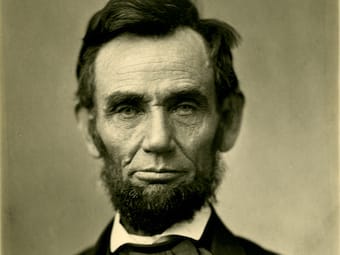Abraham Lincoln (1809-1865), President of the USA and inspiration of the Union in the Civil War. Buchan quoted Lincoln’s plea for a good definition of liberty, which should be read in the context of the struggle between Union and Confederacy. “In using the same word we do not all mean the same thing. We assume the word ‘liberty’ to mean that each worker can do as he pleases with himself and the product of his labour, while, on the other hand, it may mean that some man can do as he pleases with other men and the produce of other men’s labour.”
‘POPULAR,’ often used as an equivalent, means merely that the bulk of the people approve of a particular mode of government.* ‘Liberal,’ the other assumed equivalent, implies those notions of freedom, toleration and pacific progress which lie at the roots of Western civilisation.
The words are clearly not interchangeable. A policy or a government may be popular without being liberal or democratic; there have been highly popular tyrannies; the German policy of 1914 was popular, but it was not liberal, nor was Germany a democracy.* America is a democracy, but it is not always liberal; the French Republic has at various times in its history been both liberal and democratic without being popular. Accurately employed, ‘democratic’ describes a particular method, ‘popular’ an historical fact, ‘liberal’ a quality and an ideal.
The study of history will make us chary about the loud, vague use of formulas. It will make us anxious to see catchwords in their historical relations, and will help us to realise the maleficent effect of phrases which have a fine rhetorical appeal, but very little concrete meaning.
Abridged
Buchan is simplifying a little. ‘A popular government’ is a government that is approved by a large majority; but ‘popular government’ is a technical term roughly equivalent to democracy, i.e. government responsible to the people rather than a monarch or an elite. That said, Buchan’s point is well-taken: the fact that a government or policy is popular in the sense of ‘widely liked’ does not make it either democratic or liberal (or wise).
This volume of ‘Nations of Today’ was published in 1923. Much the same happened again ten years afterwards, when on March 23rd, 1933, the German Parliament voted to let Chancellor Adolf Hitler introduce any law he wished without consulting them, for four years. Clearly, having an elected Parliament does not make for a democracy — at least not in the British sense of that word.
Questions for Critics
1. What is the author aiming to achieve in writing this?
2. Note any words, devices or turns of phrase that strike you. How do they help the author communicate his ideas more effectively?
3. What impression does this passage make on you? How might you put that impression into words?
Based on The English Critic (1939) by NL Clay, drawing on The New Criticism: A Lecture Delivered at Columbia University, March 9, 1910, by J. E. Spingarn, Professor of Comparative Literature in Columbia University, USA.
Archive
Word Games
Spinners Find in Think and Speak
For each group of words, compose a sentence that uses all three. You can use any form of the word: for example, cat → cats, go → went, or quick → quickly, though neigh → neighbour is stretching it a bit.
This exercise uses words found in the accompanying passage.
1 Express. Lord. Very.
2 Bad. Think. Western.
3 Imply. Mode. Other.
Variations: 1. include direct and indirect speech 2. include one or more of these words: although, because, despite, either/or, if, unless, until, when, whether, which, who 3. use negatives (not, isn’t, neither/nor, never, nobody etc.)
Homophones Find in Think and Speak
In each group below, you will find words that sound the same, but differ in spelling and also in meaning. Compose your own sentences to bring out the differences between them.
This exercise uses words found in the accompanying passage.
Statements, Questions and Commands Find in Think and Speak
Use each word below in a sentence. Try to include at least one statement, one question and one command among your sentences. Note that some verbs make awkward or meaningless words of command, e.g. need, happen.
This exercise uses words found in the accompanying passage.
1 Study. 2 Determine. 3 Imply. 4 Respect. 5 Ask. 6 Describe. 7 People. 8 Appeal. 9 Realise.
Variations: 1. use a minimum of seven words for each sentence 2. include negatives, e.g. isn’t, don’t, never 3. use the words ‘must’ to make commands 4. compose a short dialogue containing all three kinds of sentence: one statement, one question and one command
High Tiles Find in Think and Speak
Make words (three letters or more) from the seven letters showing below, using any letter once only. Each letter carries a score. What is the highest-scoring word you can make?
Your Words ()
If you like what I’m doing here on Clay Lane, from time to time you could buy me a coffee.
Buy Me a Coffee is a crowdfunding website, used by over a million people. It is designed to help content creators like me make a living from their work. ‘Buy Me a Coffee’ prides itself on its security, and there is no need to register.
Related Posts
John Buchan warned that the great figures of history are often beyond their biographers’ comprehension.
Picture: By Carole Raddato, Wikimedia Commons. Licence: CC BY-SA 2.0.. Source.
Posted November 23 2018
Picture: © Bundesarchiv, Bild 183-R29818, via Wikimedia Commons. Licence: CC BY-SA 3.0.. Source.
Posted June 4 2018
John Buchan draws a distinction between political changes brought by violence and those brought by progress.
Picture: By Boris Kustodiev (1878–1927), via Wikimedia Commons. Licence: Public domain.. Source.
Posted May 24 2018
The German Empire promised wonders to restless, grudging Europe, and not to let common sense wake us from our dreams.
Picture: By Ernst Ludwig Kirchner (1880-1938), via Wikimedia Commons. Public domain.. Source.
Posted March 3 2018






